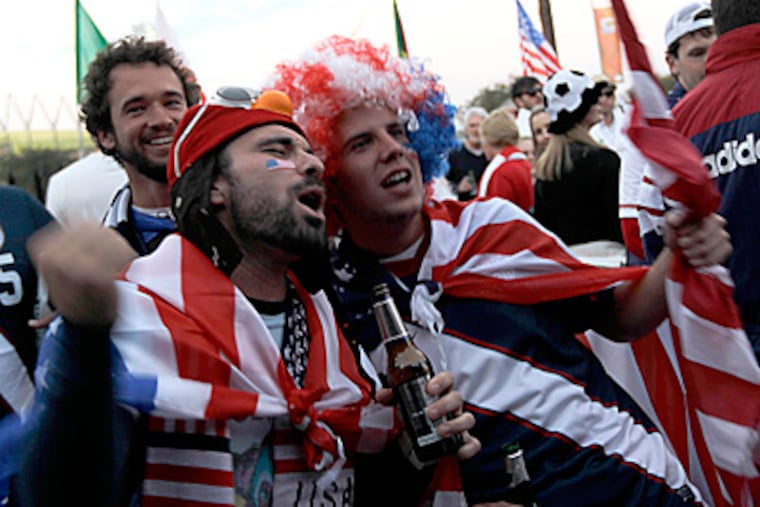Tailgating, Rustenberg style
RUSTENBURG, South Africa - Royal Bafokeng Stadium's location, surrounded by stretches of brown grass and dirt, left no confusion as to why thousands were making this journey to northwest South Africa: for soccer, for U.S.A. vs. England.

RUSTENBURG, South Africa - Royal Bafokeng Stadium's location, surrounded by stretches of brown grass and dirt, left no confusion as to why thousands were making this journey to northwest South Africa: for soccer, for U.S.A. vs. England.
Not for the food, the drinks, the scenery, or the city vibe.
The stadium is named after the Bafokeng people, who in 1999 won a legal case entitling them to 20 percent of the area's platinum profits.
RBS seats 38,646; on Saturday afternoon, before the U.S. team and England tied, 1-1, almost all of those fans were packed into a makeshift "pub" directly across the street.
The corner lot featured a bar - serving beer for a third of the price it would cost on South Street - and a "raw meat" bar, where you purchased, well, a slab of raw meat of your choosing and then carried it out to a cement-enclosed grill.
The grill-it-yourself arrangement appeared to raise skepticism at first, but soon the grill was jammed with red meat and chicken.
ESPN's Insider soccer blog proclaimed at 8:52 Eastern Time that "The U.S. ain't losing today." Folks at the Worldwide Leader must have been glad when England goalie Robert Green became his country's Bill Buckner, because there was zero chance the U.S. team wasn't losing.
In the first minutes of Saturday's match, U.S. defender Carlos Bocanegra's kick went off an England defender's back and soared well out of bounds. Bocanegra stood on the sidelines facing away from the field, looking for the next ball to throw in. He kept waiting, looking up and down the sideline. There was no extra ball to give him. You could almost feel the racing heartbeat of the FIFA official sitting pitch-side who eventually stood up and threw up his hands.
The ball eventually arrived; they arrived promptly for the rest of the match.
FIFA announced Saturday that it would work on correcting a "minor glitch" experienced Friday, the World Cup's first day of competition. The issue was transportation: getting into and out of Soccer City stadium. On Friday, it would have been easier to get a one-on-one interview with David Beckham than to drive through the traffic that paralyzed the roads surrounding Soccer City.
Rich Mkhondo, chief communications officer for the Local Organizing Committee (LOC), felt the problem came from the public's lack of trust in South Africa's public transport system.
Ya think?
"The transportation challenges are caused by people," Mkhondo said. "I would like to say the change of people's willingness to use public transportation would help us a great deal."
Before the implementation of a bus and rail system, both recently completed for these games, South Africa hasn't had a highly functioning public transport system. So, basically, Mkhondo is saying, "Yeah, it's cool, take the bus, we're pretty sure it's going to work."
Mkhondo and the LOC have an uphill battle if they believe one public recommendation is going to reverse years of habit.
South Africa goalkeeper Itumeleng Khune said he felt his team's fans, all 89,000 of them, weren't loud enough on Friday. He said the match, "felt like a Mexico home game." A few months ago, Bafana Bafana couldn't have given tickets away even if they came with a free pair of cleats. South Africa struggled to get more than 1,000 fans at a national team match.
Now its goalie is disappointed that 89,000 fans were blowing vuvuzelas only 65 percent of the time, not 90 percent.